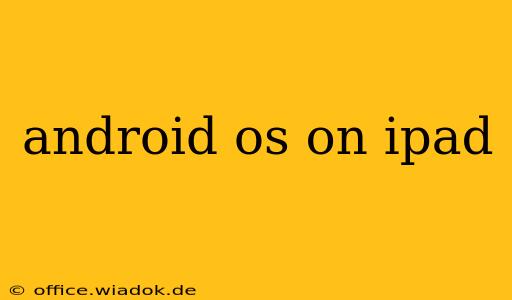The idea of running Android on an iPad might seem like a tech enthusiast's pipe dream, a bizarre hybrid defying the natural order of things. But let's delve into the fascinating "what if" scenario, exploring the technical hurdles, potential benefits, and the likelihood of this ever becoming a reality.
The Fundamental Obstacles: Hardware and Software
The core challenge lies in the fundamental differences between Apple's iOS/iPadOS ecosystem and the Android operating system. While both are built upon Unix-like kernels, their architectures, drivers, and APIs diverge significantly.
1. Hardware Incompatibility:
-
Chipset Differences: iPads utilize Apple's proprietary A-series system-on-a-chip (SoC), while Android devices employ a wider variety of SoCs from companies like Qualcomm, MediaTek, and Samsung. Android is designed to work across this diverse hardware landscape, whereas iOS/iPadOS is tightly integrated with Apple's silicon. Porting Android to an A-series chip would require extensive reverse engineering and driver development—a monumental task.
-
Peripheral Compatibility: The iPad's specific hardware components (display controllers, touch sensors, cameras, etc.) are not designed to work directly with Android's drivers. Creating compatible drivers is a significant engineering challenge.
2. Software Incompatibility:
-
API Differences: The application programming interfaces (APIs) used by Android and iOS/iPadOS are vastly different. Android apps rely on a distinct set of APIs, making it nearly impossible for them to run directly on an iPad without significant modification or emulation. This poses a major challenge, as even emulating the Android runtime would be resource-intensive on an iPad's architecture.
-
Kernel Divergence: While both operating systems share a Unix-like kernel heritage, their implementations differ substantially. The iPad's kernel is tailored specifically for Apple's hardware and software, making direct porting extremely difficult.
Potential Benefits (Hypothetical):
Despite the formidable challenges, let's briefly consider the potential advantages if, by some miracle, Android were to run flawlessly on an iPad:
-
Expanded App Ecosystem: Access to the massive Google Play Store would dramatically expand the available apps on the iPad. This could attract users who prefer the diversity of Android's app ecosystem.
-
Customization Options: Android's well-known flexibility and extensive customization options could be applied to the iPad, offering a far more malleable user experience than the relatively restrictive iOS/iPadOS.
-
Open-Source Advantages: Leveraging Android's open-source nature could potentially allow for more community-driven development and customization possibilities for the iPad.
The Likelihood: Extremely Low
Considering the technical hurdles, the sheer scale of reverse engineering and development required, and the lack of any evident incentive for Apple (or any other significant player) to undertake such a project, the likelihood of Android ever officially running on an iPad remains exceptionally low. It's more of a thought experiment than a realistic prospect.
Conclusion: A Fascinating "What If"
The dream of running Android on an iPad, while tempting for some users, faces incredibly significant technical obstacles. The effort required vastly outweighs the currently foreseeable benefits. While the idea sparks imagination, the practical reality points toward it remaining a fascinating, but ultimately improbable, scenario.

